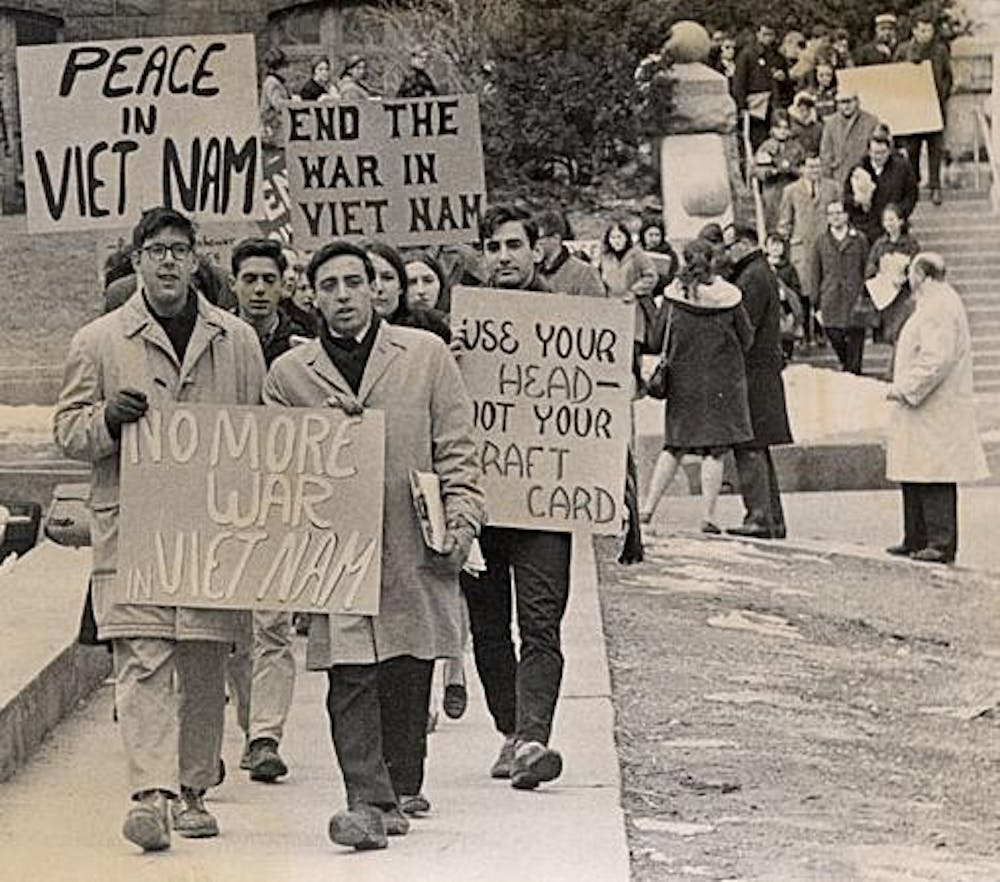This Tuesday, University of Richmond will welcome Edwin Meese III to speak at a special event held at the Jepson Alumni Center. His topic, the role of law enforcement in today’s society, is one that he is well qualified to address. As the attorney general of the United States under President Reagan, Meese was responsible for tackling societal issues on the largest scale possible in this country. However, none were likely bigger than what he encountered while still working for the state of California.
During the 1960s, the rambunctious student population of UC Berkeley became internationally famous for a series of protests stemming from discord over the Vietnam War. As Governor Reagan’s chief of staff, Meese was directly involved with dealing with the uproarious youth. Such dealings will forever be noted in history, perhaps infamously so, as a defining clash within America at the time. The marauding Berkeley students were a product of their society, and represented the outflow of pent up feelings many were harboring within the nation.
Today we find ourselves in a similar time of social upheaval where pent up anger has overwhelmed the hearth and spilt out onto the streets in a fiery blaze. A lot of this anger is directed at our police forces. In a recent Reuters Poll, only 53% of Americans said they could trust the police to be “fair and just,” with the rest either disagreeing or expressing uncertainty. Widely publicized events in Missouri and New York City have prompted many of the negative feelings throughout the country, and appear to have shaken the public’s trust in law enforcement.
During the 1960s and into the early 1970s, iconic pictures of young protestors clashing with police covered the front pages of many news outlets. There always stood two polarized sides, the angry demonstrators facing off against the assembled police force. Lined up like WWI trench fighters, the police and the students looked like bitter enemies. But looking back today, this wasn’t really the case. The students probably didn’t wake up in the morning intending to go out and have a spat with a stone-faced officer. They were out to garner the attention needed to bring national light to the greatest injustice they saw happening in their world, namely, the Vietnam War.
California couldn’t have thousands of hot-blooded youth prowling around city blocks all day, however noble the students believed their cause was. It was disruptive to everyday life and generally good for nobody. So our elected government officials called in the cavalry to disperse the masses and restore order. Fate drew the protestors and the police together in California during the 1960s, but to the students those officers came to be a tangible representation of the very evil they believed they were up against. I imagine that the police didn’t care much to be out there either. In fact, I would bet that every police officer out there today wishes their job did not have to exist. But unfortunately, when it comes to peace and humanity, Earth gets but one selection.
When public opinion polls of an individual, such as a politician, or of one entity, such as a company, are done responsibly, I will usually acknowledge them. In these instances, the subject is homogenous. One person. One company. However, with something like public opinion of police, I can’t buy it. Police aren’t like business executives who might be pulled from across the nation’s business schools to serve on a single board. They aren’t recruited from across the country to ride around in squad cars and issue traffic violations in a specific locality. Our police tend to come from the very communities they serve, which makes it hard for me to believe that so many communities are having problems trusting so many of their own members.
When I was a kid I would sometimes become angry about something that I was holding onto inside. I wouldn’t let what it was out, but if prompted by some external flashpoint, usually an annoying sibling, the anger would flow out in a momentous purge. I would harbor animosity toward those who made me responsible for my actions, usually a parent, but my anger was never rooted against them. We’ve all had encounters like this, and we all know that they are the result of our inability to fix something in our own lives that was digging at us at that point in time.
Today I believe that America has a thorn in her side that over the decades she has tried to forget. However, in time the thorn has grown inflamed and infected, and refuses to go away. Anger and rage directed at the police stems not from their collective faults, but from our failure as a society to address deeper-seated issues that throb in our collective conscience.
Contact Opinions Editor Joe DiBello at joseph.dibello@richmond.edu
Enjoy what you're reading?
Signup for our newsletter
Support independent student media
You can make a tax-deductible donation by clicking the button below, which takes you to our secure PayPal account. The page is set up to receive contributions in whatever amount you designate. We look forward to using the money we raise to further our mission of providing honest and accurate information to students, faculty, staff, alumni and others in the general public.
Donate Now



